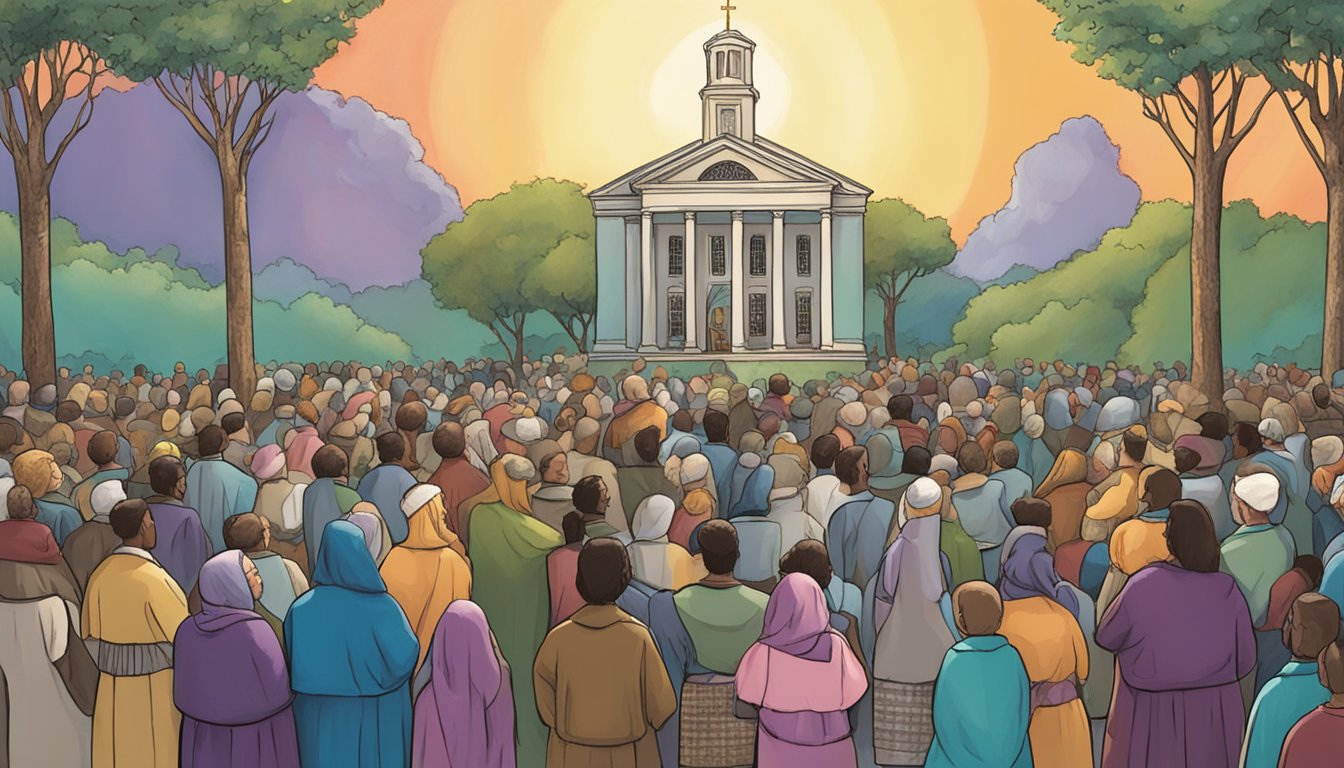Leonard Cohen’s “Hallelujah” is a song that has captivated audiences for decades with its poignant lyrics and haunting melody. The song has become a beloved classic, with its popularity only growing over time. However, there has been much debate over whether “Hallelujah” can be classified as a Christian song.


The origins of “Hallelujah” can be traced back to Cohen’s personal life and his experiences with love, heartbreak, and spirituality. The song’s lyrics are rich with religious references, with the single word “Hallelujah” being used as its chorus. While the song has become a staple in many religious settings, there is still much debate over whether it can be classified as a Christian song.
Despite the ongoing debate, “Hallelujah” has had a significant cultural impact and has been covered by countless artists across various genres. The song’s enduring legacy has made it a timeless classic that continues to resonate with audiences of all ages.
Origins of ‘Hallelujah’


Leonard Cohen’s Inspiration
Leonard Cohen, the Canadian singer-songwriter, wrote “Hallelujah” for his 1984 album, “Various Positions.” The song was inspired by Cohen’s personal life and experiences, including his struggles with love, faith, and spirituality. In an interview, Cohen said that he wrote “Hallelujah” as a response to his own “inability to understand the state of grace” that he had experienced in his life.
Musical Composition
Cohen’s original version of “Hallelujah” was over 80 verses long and took him several years to perfect. He wrote multiple drafts of the song, each with different lyrics and themes. The final version of the song that appeared on “Various Positions” was shorter and more polished, but still retained the same emotional intensity and spiritual themes as the earlier versions.
The musical composition of “Hallelujah” is also notable for its use of religious imagery and biblical references. The song’s title, “Hallelujah,” is a Hebrew word that means “praise the Lord.” The lyrics of the song reference several biblical figures, including King David and Samson, and allude to stories from the Old Testament.
In conclusion, “Hallelujah” is a deeply personal and spiritual song that reflects Leonard Cohen’s own struggles with faith and love. The song’s musical composition and use of religious imagery have made it a beloved and enduring classic.
Lyrical Analysis
https://www.youtube.com/watch?v=oQgzttHb8ug&embed=true
Biblical Imagery
Leonard Cohen’s “Hallelujah” contains several references to Biblical imagery, including King David, Samson, and Bathsheba. The song’s opening line, “Now I’ve heard there was a secret chord / That David played and it pleased the Lord,” alludes to the story of King David, who was known for his musical talents and his relationship with God. The mention of Samson and Delilah in the second verse, “You say I’m dirty but I have a thread of grace / And what’s more, I know that you have hair like Samson’s,” refers to the Biblical story of Samson, who lost his strength when his hair was cut off by Delilah. Finally, the line “she broke your throne, she cut your hair” in the fourth verse is a reference to Bathsheba, who caused King David to sin and ultimately led to the downfall of his kingdom.
Interpretation of Verses
The lyrics of “Hallelujah” are often interpreted in different ways, depending on the listener’s perspective. The song’s verses are open to interpretation, but they generally touch on themes of faith, sin, and grace. In the first verse, the lyrics suggest that even though David’s music pleased God, he still fell from grace. The second verse speaks of a “cold and broken Hallelujah,” which could be interpreted as a reference to a broken relationship with God. The third verse seems to focus on the theme of love, with the lyrics “Love is not a victory march / It’s a cold and it’s a broken Hallelujah.” Finally, the fourth verse speaks of the power of love to overcome pain and suffering.
Themes of Love and Loss
One of the most prominent themes in “Hallelujah” is love and loss. The song’s lyrics suggest that love can be a powerful force, but it can also be painful. The second verse speaks of a “broken Hallelujah,” which could be interpreted as a reference to the pain of lost love. The third verse suggests that love is not always easy, but it is worth fighting for. The final verse speaks of the power of love to overcome even the darkest of times. Overall, “Hallelujah” is a song that speaks to the human experience of love and loss, and the power of faith to overcome even the most difficult of circumstances.
Religious Overtones
https://www.youtube.com/watch?v=LRP8d7hhpoQ&embed=true

The song “Hallelujah” by Leonard Cohen has been the subject of much debate regarding its religious overtones. While the song contains religious imagery and references, it is not a straightforward Christian song. Instead, it explores universal themes of struggle, redemption, and the search for meaning.
Christian Imagery
The Christian imagery in “Hallelujah” is undeniable. The word “Hallelujah” itself is a Hebrew word meaning “praise the Lord.” The song also references King David, who is an important figure in the Bible. The lyrics “I heard there was a secret chord / That David played and it pleased the Lord” allude to the story of David playing his harp to soothe King Saul in the Old Testament.
However, the song does not simply celebrate Christianity. In fact, some interpretations of the song suggest that it is a critique of the church. The lyrics “You say I’m dirty but I want to be clean / And I want to be delivered” suggest a longing for spiritual purity that is not being fulfilled by the church.
Jewish References
In addition to Christian imagery, “Hallelujah” also contains Jewish references. The song references the biblical story of Samson and Delilah, as well as the story of King David. The line “She tied you to her kitchen chair / She broke your throne and she cut your hair” alludes to the story of Samson, who lost his strength when his hair was cut.
The song also references the story of King David and Bathsheba, with the lyrics “You say I’m dirty but I want to be clean / And I want to be delivered.” This is a reference to David’s affair with Bathsheba, which is considered a sin in the Bible.
Spiritual Elements
While “Hallelujah” contains religious imagery and references, it is ultimately a song about the human experience of struggle and redemption. The lyrics “There’s a blaze of light in every word / It doesn’t matter which you heard / The holy or the broken Hallelujah” suggest that redemption can be found in both the sacred and the profane.
The song also explores the idea of spiritual transcendence. The lyrics “I did my best, it wasn’t much / I couldn’t feel, so I tried to touch / I’ve told the truth, I didn’t come to fool ya / And even though it all went wrong / I’ll stand before the Lord of Song / With nothing on my tongue but Hallelujah” suggest a longing for spiritual connection and transcendence.
Overall, “Hallelujah” is a complex and deeply introspective song that explores universal themes of struggle, redemption, and the search for meaning. While it contains religious imagery and references, it is not a straightforward Christian song, but rather a meditation on the human experience of spirituality.
Cultural Impact

The song “Hallelujah” has had a massive cultural impact since its release. It has been covered by many artists and included in various media. Here are some notable examples of its cultural impact.
Cover Versions

One of the most famous covers of “Hallelujah” was by Jeff Buckley in 1994. His version of the song is often cited as one of the best covers of all time. Other notable covers include John Cale’s 1991 version, which was used in the movie “Shrek,” and Rufus Wainwright’s 2001 version, which was included in the movie “I Am Sam.” K.D. Lang also covered the song at the 2010 Winter Olympics opening ceremony.
The song has been covered by many other artists over the years, including Bon Jovi, Justin Timberlake, and Alexandra Burke. It has been performed on many TV shows, including “The X Factor” and “American Idol.”
Inclusion in Media
“Hallelujah” has been included in many movies, TV shows, and commercials over the years. It was used in the movie “Watchmen” and the TV show “The West Wing.” It has also been used in commercials for the video game “Assassin’s Creed” and the TV show “The Blacklist.”
In 2012, a tribute album called “The Royal Philharmonic Orchestra Plays the Music of Leonard Cohen” was released. The album included a version of “Hallelujah” performed by the Royal Philharmonic Orchestra.
Overall, “Hallelujah” has had a significant impact on popular culture. Its popularity continues to grow, and it is considered one of the greatest songs of all time.
The Debate: Is ‘Hallelujah’ a Christian Song?

https://www.youtube.com/watch?v=suXXd9j529M&embed=true
Differing Perspectives
The question of whether “Hallelujah” is a Christian song has been the subject of much debate. Leonard Cohen, the song’s writer, was Jewish, and the lyrics contain both religious and secular references. Some argue that the song is a celebration of spirituality and faith, while others view it as a reflection on the darker aspects of human nature.
There are those who believe that the song’s use of the word “Hallelujah” makes it inherently religious. However, as one source points out, the word itself simply means “praise the Lord” and is used in both religious and secular contexts. In fact, the song’s lyrics contain references to biblical figures such as David and Samson, as well as secular themes such as love and heartbreak.
Use in Religious Services
Despite the debate over its religious meaning, “Hallelujah” has become a popular choice for religious services. The song’s haunting melody and powerful lyrics have resonated with audiences of all faiths, and it has been performed by both Christian and Jewish artists.
In some cases, the song has been adapted to include more explicitly Christian lyrics. For example, a Christian version of the song has been written that replaces some of the original lyrics with references to Jesus and the Bible. However, this version is not widely recognized and has not achieved the same level of popularity as the original.

Overall, the debate over whether “Hallelujah” is a Christian song is likely to continue. While the song’s lyrics contain both religious and secular references, its meaning ultimately depends on the interpretation of the listener.
Notable Performances
https://www.youtube.com/watch?v=P_NpxTWbovE&embed=true
Live Renditions
“Hallelujah” has been performed live by numerous artists, each putting their unique spin on the song. One of the most notable live renditions was performed by Jeff Buckley at a tribute concert for his father, Tim Buckley, in 1991. Buckley’s hauntingly beautiful rendition is considered by many to be the definitive version of the song.
Other notable live performances include Bon Jovi’s rendition at the 2009 Rock and Roll Hall of Fame induction ceremony, Regina Spektor’s performance on the Late Show with David Letterman in 2006, and Willie Nelson’s performance at Farm Aid in 2013.
Tributes and Memorials
“Hallelujah” has also been used as a tribute song to honor the memory of notable figures. For example, Canadian politician Jack Layton was eulogized with a rendition of the song at his funeral in 2011. The performance, which was led by former Barenaked Ladies frontman Steven Page, brought the crowd to tears.

The song has also been used to pay tribute to other artists who have passed away, such as Leonard Cohen himself. After Cohen’s death in 2016, numerous artists performed the song as a tribute to the legendary singer-songwriter.
Overall, “Hallelujah” has become a beloved song that has been performed in a variety of settings, from live concerts to memorials. Its emotional depth and interpretive lyrics have made it a timeless classic that continues to resonate with audiences today.
Influence on Other Artists

Rock and Gospel Music
Leonard Cohen’s “Hallelujah” has been covered by numerous artists across different genres, including rock and gospel music. One of the most notable covers is Jeff Buckley’s version, which has become a classic in its own right. Buckley’s rendition features his signature soaring vocals and a stripped-down arrangement that highlights the song’s emotional depth.
Bob Dylan, another legendary singer-songwriter, has also covered “Hallelujah” in his concerts. While Dylan’s version is less well-known than Buckley’s, it showcases his unique interpretation of the song and his ability to make it his own.
Contemporary Interpretations

In recent years, “Hallelujah” has been covered by a diverse range of artists, including Brandi Carlile, Bono, and Pentatonix. Carlile’s version, which features a gospel choir, brings a new dimension to the song’s spiritual themes. Bono’s version, which he performed at a tribute concert for Cohen, is a powerful rendition that showcases his signature vocal style.
Pentatonix, a popular a cappella group, has also covered “Hallelujah” in their unique style. Their version features intricate harmonies and vocal percussion, demonstrating the song’s versatility and adaptability to different musical genres.
Overall, “Hallelujah” has had a significant influence on other artists, inspiring them to create their own interpretations of the song. From rock and gospel music to contemporary a cappella, the song’s enduring popularity is a testament to its emotional resonance and timeless appeal.
Chart Success and Recognition

Billboard and Rolling Stone
“Hallelujah” has achieved immense chart success and critical acclaim since its release in 1984. Although it did not chart on the Billboard Hot 100 upon release, it has since become a beloved classic and has charted multiple times in various renditions.

In 2008, Jeff Buckley’s version of the song charted at number 86 on the Billboard Hot 100, marking its first appearance on the chart. The following year, after being performed on “American Idol,” the song re-entered the chart and peaked at number 13.
Furthermore, the song has received recognition from Rolling Stone, who ranked it as number 264 on their list of “The 500 Greatest Songs of All Time.” The magazine also included it on their list of “The 50 Best Songs of the Decade (2000-2009)” at number 10.
The song’s enduring popularity and critical acclaim speak to its universal appeal and timeless quality. It has been covered by numerous artists across genres and has been featured in various films, television shows, and commercials. Its impact on popular culture is undeniable, and its legacy as a beloved classic will continue for generations to come.
The Song’s Legacy

Influence on Music History
Leonard Cohen’s “Hallelujah” has left a lasting legacy on music history. The song, originally released in 1984, has been covered by countless artists and has become a staple in popular culture. Its legacy is a testament to the power of music to transcend time and to touch the hearts of people from all walks of life.

The song’s popularity has only grown over the years, with covers by Jeff Buckley, Rufus Wainwright, and many others. Its timeless message of love, loss, and redemption has resonated with listeners for decades. It has even been used in TV shows, movies, and commercials, further solidifying its place in popular culture.
Leonard Cohen’s Later Works
Despite the success of “Hallelujah,” Leonard Cohen continued to create music until his death in 2016. His later works were a departure from the old ideas of love and loss that he explored in “Hallelujah.” Instead, he turned his attention to themes of mortality, spirituality, and faith.
One of his final albums, “You Want It Darker,” was released just weeks before his death. The album was a haunting reflection on life and death, with Cohen confronting his own mortality in the lyrics. Despite the darker themes, the album was well-received by critics and fans alike, cementing Cohen’s place as one of the greatest songwriters of all time.
In conclusion, Leonard Cohen’s “Hallelujah” has left an indelible mark on music history. Its legacy is a testament to the power of music to transcend time and to touch the hearts of people from all walks of life. Cohen’s later works continued to explore themes of mortality and spirituality, showcasing his range as a songwriter and cementing his place as a legend in the music industry.
Controversies and Misinterpretations

Misconstrued Meanings

The song “Hallelujah” by Leonard Cohen has been the subject of much debate over the years, with many people questioning whether it should be considered a Christian song. One of the main reasons for this debate is the fact that the song contains a number of references to biblical figures and stories. However, some people argue that the meaning of these references is often misconstrued.
For example, the line “You say I took the name in vain / I don’t even know the name” has been interpreted by some as a reference to the third commandment, which forbids the use of God’s name in vain. However, others argue that the line is actually a reference to the story of Samson and Delilah, in which Samson loses his strength after Delilah cuts his hair.
Similarly, the line “I’ve seen your flag on the marble arch / Love is not a victory march” has been interpreted by some as a reference to the crucifixion of Jesus. However, others argue that the line is actually a reference to the story of Absalom, who rebelled against his father King David and was killed in battle.
Controversial Uses
In addition to the debate over the meaning of the song, there have also been controversies over its use in various contexts. For example, the song was famously used in the movie “Shrek,” which led to a surge in its popularity. However, some people have criticized this use of the song, arguing that it trivializes its religious and spiritual themes.
Similarly, the song has been used in a number of political contexts over the years, which has also led to controversy. For example, the song was played at the Democratic National Convention in 2016, which led to criticism from some conservative commentators who argued that the song should not be used for political purposes.
Overall, the controversies and misinterpretations surrounding “Hallelujah” highlight the complexity of interpreting religious and spiritual themes in popular culture. While the song has clearly resonated with many people over the years, its meaning and significance continue to be debated and contested.
Frequently Asked Questions

What is the significance of the lyrics in Leonard Cohen’s ‘Hallelujah’?
The lyrics in Leonard Cohen’s ‘Hallelujah’ are poetic and metaphorical. The song speaks about love, heartbreak, and faith. The word “Hallelujah” is repeated throughout the song, and it is a Hebrew word that means “praise the Lord.” The song’s lyrics are open to interpretation, and different people may find different meanings in them.
Can ‘Hallelujah’ be classified as a religious or spiritual song?
The answer to this question is debatable. While the word “Hallelujah” is a religious term, the song’s lyrics are not explicitly religious. The song speaks about love, pain, and the human experience. Some people may interpret the song’s lyrics as spiritual, while others may not.
Why might ‘Hallelujah’ be considered controversial in a religious context?
‘Hallelujah’ might be considered controversial in a religious context because the song’s lyrics are open to interpretation, and they do not explicitly mention God or any religious figure. Additionally, some people may find the song’s themes of love, sex, and heartbreak to be inappropriate for religious contexts.
Is ‘Hallelujah’ commonly used in Christian religious services or ceremonies?
While ‘Hallelujah’ is not a traditional Christian hymn, some churches have incorporated the song into their services. The song’s themes of love, heartbreak, and faith may resonate with some congregations. However, the decision to use the song in religious services is up to the discretion of individual churches and their leaders.
How has ‘Hallelujah’ become associated with Christmas and funerals?
‘Hallelujah’ has become associated with Christmas and funerals because of its themes of love, loss, and redemption. The song’s lyrics can be interpreted as a message of hope and comfort during times of grief. Additionally, some covers of the song, such as Jeff Buckley’s version, have become popular during the holiday season.
Does ‘Hallelujah’ hold any particular meaning in Jewish tradition?
The word “Hallelujah” has its roots in Jewish tradition and is commonly used in Jewish prayer and liturgy. However, the song ‘Hallelujah’ does not hold any particular meaning in Jewish tradition beyond the word itself.












